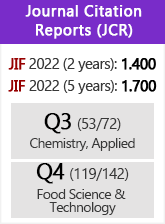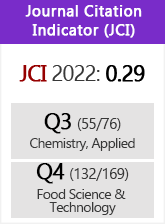Reducing the bloater spoilage incidence in fermented green olives during storage
DOI:
https://doi.org/10.3989/gya.2002.v53.i3.325Keywords:
Table olives, Alambrado, Lactobacillus plantarum, Potassium sorbate, yeastsAbstract
Fermented green olives of the variety “Picholine” were brined in 5% NaCl solutions, which were adjusted to pH 4.00 and 5.00 with lactic acid. Potassium sorbate was added to the brine at 0.05 % and the assays were inoculated with Lactobacillus plantarum strain I159, and Pichia anomala strains S18 from our collection. The pH values and microbial counts including Gram negative bacteria, yeasts and moulds, and lactic acid bacteria were followed during 6 months of storage. Results showed that even if the olives were inoculated with a high gas producing yeast (P. anomala S18), the attack of the fruits by the “bloater” spoilage was drastically reduced in the assays adjusted to pH4, added with potassium sorbate and inoculated with L. plantarum, without affecting the organoleptic characteristics of the product.
Downloads
Download data is not yet available.
Downloads
Published
2002-09-30
How to Cite
1.
Asehraou A, Peres C, Faid M, Brito D. Reducing the bloater spoilage incidence in fermented green olives during storage. Grasas aceites [Internet]. 2002Sep.30 [cited 2024Apr.16];53(3):330-4. Available from: https://grasasyaceites.revistas.csic.es/index.php/grasasyaceites/article/view/325
Issue
Section
Research
License
Copyright (c) 2002 Consejo Superior de Investigaciones Científicas (CSIC)

This work is licensed under a Creative Commons Attribution 4.0 International License.
© CSIC. Manuscripts published in both the printed and online versions of this Journal are the property of Consejo Superior de Investigaciones Científicas, and quoting this source is a requirement for any partial or full reproduction.All contents of this electronic edition, except where otherwise noted, are distributed under a “Creative Commons Attribution 4.0 International” (CC BY 4.0) License. You may read here the basic information and the legal text of the license. The indication of the CC BY 4.0 License must be expressly stated in this way when necessary.
Self-archiving in repositories, personal webpages or similar, of any version other than the published by the Editor, is not allowed.
















